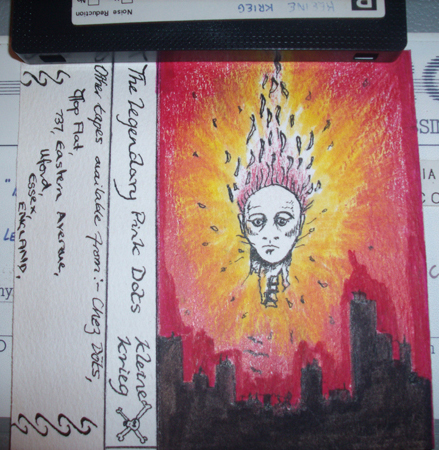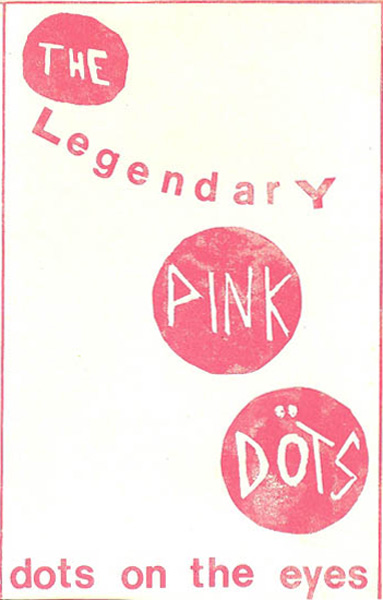
Edward Ka-Spel‘s brilliance with The Legendary Pink Dots is to introduce us to isolated characters and then immerse us in their world-view through expansive and mysterious soundscapes. He begins with the most restricted, infinitesimal point of consciousness and then slowly expands it outward towards a state of ‘cosmic consciousness’ (to use the phrase of 1960s psychonauts). Musically, he often follows this template of expansion, with simple melody lines repeating and layering in increased complexity of texture. Much of the LPD’s music is an undertaking to help the listener (and perhaps composer) escape his/her own head. Lyrical phrases, musical motifs, album titles and themes recur across decades, but tonal shifts between albums are slow and subtle. Hopefully, The Legendary Dots Project, like the Residents and Sparks projects before, will provide the keen reader and listener with a giddy entry-point into the Legendary Pink Dots’ musical world. Fulfil the prophecy!
Adam: Kleine Krieg from 1981 is one of the jumble of cassette releases from the early days of the Dots, which contains material substantially represented elsewhere – in this case, upon Chemical Playschool 1 & 2. As such, this review will be swift and scanty, though appreciative.
As an introduction to early-period L.P.D. Kleine Krieg is quite wonderful. ”Defeated” is a lovely, juddering lament, awash with vulnerability. The lyrics are stark, but enigmatic, concerning “Crazy Carrie” who crawls her way into a cafe called Madonna’s, where she finds respite while still remaining “defeated”. The softness of the music and Ka-Spel’s delivery offer sympathy for the poor protagonist, even as her behaviour is described with a distance that borders on the voyeuristic. “Deflated”, which follows, is filled with a rich soundscape of organic samples, including the chirping of birds, a siren and children’s voices. It sounds like a field recording from a park in a futuristic London.

What marks Kleine Krieg out and makes it a stronger effort – in my books – than Chemical Playschool 1 & 2 and on a par with Only Dreaming, is the way the music flows between tracks. It feels coherent in a way that Chemical Playschool 1 & 2 does not. The bustling and playful “Black Highway” benefits from its positioning here early in the album, where the listener is hopefully alert enough to attend closely to the track’s dense stream-of-consciousness lyrics. Upon last listening I caught a previously-missed reference to the narrator’s claims of madness in his family since the 16th century. A explanation offered, perhaps, for his apparent psychosis behind the driver’s wheel, which recalls the libidinal pleasure of the fetishistic joy-riders of J.G. Ballard‘s 1973 novel Crash, which surely wields an influence here. “Black Highway” is still one of my favourites of these early tracks, not least due to the gleeful exuberance of Ka-Spel’s delivery that commingles obscenely with the violence he describes.
The energy doesn’t let up with “Soma Bath” and only slows for the scathing and incendiary “Peace Krime 2” before ratcheting up again for (the somewhat ubiquitous) “Break Day”. To my untrained ears, the arrangements here sound a little different. The samples of Baroness Thatcher in “Peace Krime 2” stand out harshly against a rather beautiful, tingly piece of keyboard playing. It is easy to imagine her as the ‘Old Iron Woman‘ of Raymond Briggs‘ satirical 1984 picture book about the Falklands War. “Break Day” is lengthened and softened, which I think strips the song a little of its punch.
Some of the arrangements carry the benefit of rendering Ka-Spel’s brilliant, evocative lyrics more legible. “Stoned Obituary” is peppered with visceral Christian imagery related to the crucifixion. The track does not appear on Only Dreaming or Chemical Playschool 1 & 2 and while not quite classic Dots, it has a very gratifyingly applied drum machine and a troubling refrain of “die with your eyes on”. The phrase later crops up as the title for the penultimate song on the album. With its melodies chained to a strong beat, “Stoned Obituary” is one of the most oddly danceable tracks on the album. It was, however,a mistake to place it so close to the rambling and mangled “Stars on Sunday”, which sounds entertainingly like the Residents’ Third Reich n’ Roll in places, but is pretty dispensable. “Legacy” remains shockingly beautiful. “Brill” is a busy and disorienting remix of many tracks already encountered. I certainly caught a snippet of “Phallus Dei” from Only Dreaming.
Of course, many comments have already been made about 80% of the material on this album. If it applied in the previous reviews, it applies here. However, taken on its own merits Kleine Krieg is a synthy low-fi gem and is recommended.

P.S. Compilation album Dots On The Eyes also from 1981 would otherwise have been next to receive coverage but its track-listing is exactly the same as Chemical Playschool 1-2, save the inclusion of “March”, which shares its name with one of my favourite Cardiacs ditties and sounds like an aquatic death squad. At the risk of fatiguing ourselves on the same material, it will not receive its own review.
Matt: As I mentioned on Chemical Playschool 1 & 2, I quite liked all the material, but found it overwhelming to listen to back to back to back to back. Kleine Krieg (which, if you’re curious, means “Small War”) bears this out — it’s still long, almost a 90-minute cassette’s worth of music, but that’s not TOO long by any means, particularly when it flows like an album which, as Adam points out above, Chemical Playschool doesn’t really. (That said, considering that Kleine Krieg has some of the same tracks as Only Dreaming, I’m kind of glad that we’re putting this segment to bed and getting some new stuff for next time! Though I did check ahead to Brighter Now and found out that, it too, has “Soma Bath” on it as well…. I do like that song, though, but still!)
I have to admit that the more collage-y tracks like “Peace Krime 2” tend to stick out a bit better on Kleine Krieg — I listened to that one a couple times while doing Chemical Playschool, but it just didn’t stick in the mind like it does listening to it here. I think that’s the problem with Chemical Playschool for me — it’s so long that otherwise really great tracks just kind of get pushed to the bottom of the soup and get missed. Here, stuff like that ends up floating to the top and providing its own flavor.
I don’t have a whole lot to say about this one that I haven’t said elsewhere, but honestly, if you’re intrigued by Chemical Playschool 1 & 2 but don’t want to have the whole thing in front of you, check out Kleine Krieg; it’s much more listenable — just in that it’s an album, not a huge sprawling compilation of just about everything recorded at that time.
Tom: This release continues a trend wherein we are treated to slightly re-jigged versions of songs on OD and CP1&2. I liked ‘Brill’ last time around, its giddy swirl is present and correct here – but with a fitting brass band accompanied chorale as it fades away. ‘Peace Krime 2’ contains an extended intro, with E-KS’s vocoderised voice difficult to make out, other than some raging expletives prior to the entrance of the sampled ‘Iron Lady’. I hadn’t mentioned ‘One for the Pearl Moon’ when discussing CP1&2; a solidly bass anchored, eastern sounding tune – redolent musically of some of what The Specials and Madness were doing at this time.

‘Down from the Country’ is stripped-down and low-key; with deadpan lyrics about finding a girl and “a flat and a mattress”, and the 9-to-5 work routine. It is another moment where Ka-Spel’s discomfort at ‘normal’ values is evident. While the timbre of their voices couldn’t be more different, it may be instructive to compare EK-S with the great Vivian Stanshall, of the Bonzo Dog Band and an underrated solo career. This song presents a very early 1980s vista of arcade games, nightclubs and switchblades: “And he played Space Invaders!” Yet, the music lacks any sense of drama or the panoramic with its unassuming, simple beats and toothless guitar. A bonus track ‘Closet Kings’ has a similarly basic, inconsequential feel. Some of the chords are evocative, but it feels a little sketchy in comparison to the more fleshed out LPD material of 1981. ‘Die With Your Eyes On’ is one of many reversed fragments on this and the last release; it doesn’t grab me any more or less than ‘The Palace of Love’. Better is ‘Deflated’, which is an evocative mix of weird synth tones and field recordings.
‘Stoned Obituary’ is the most tangible new thing here. A remorseless, circling chord sequence – wistful, plangent, doleful – played on washed out synth. It is dazed, distant stuff, but much more compelling than the other new tracks. While it is loosely constructed in its 9-minute form here and will clearly be further refined on subsequent records, this song has a melancholy tunefulness and bizarre lyrics about “cartwheeling down the hill”, bringing the clowns in and obscure references to religion. After the four-minute mark, a more syncopated beat kicks in and it steps up a gear. “Sancti Dominie nomini spiritus!” A doomy Latin refrain is backed by subtle electronics. ‘Vigie’ doesn’t quite demand the same engagement, with the familiar synth-haze fading away to be replaced by a barely tangible sampled voice – expressing some confusion over his identity: “Derek or Eric?” Then followed by minor electronic squelches and twenty-five seconds of silence.
Kleine Krieg would work very well indeed for someone who hadn’t encountered the previous records, and provides a few distinct pleasures in itself. As Adam mentions, Dots on the Eyes would be a bit of a strain to review with its yet further repetition of tracks! But it does have the ominous ‘March’, with a typical mix of the innocuous and sinister, with its opening quotation of Flanagan and Allen’s popular standby ‘Underneath the Arches’ (1932) leading into a shadowy scenario of war.










